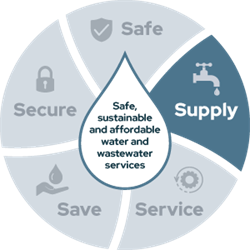Wastewater and treatment
Wastewater is the name given to water after it goes down the drain. It does not include roof water or surface run-off.
It is important for all residents to understand that what goes down their drain can damage our wastewater system. This can affect the cost of operating the sewerage system, as well as causing sewer overflows, damage to pipes and overloading pump stations and treatment plants.
What can you do to help?
Never flush:
- wet wipes (even ‘flushable’ ones)
- pads and tampons
- cotton buds
- condoms
- floss
- cigarette butts
Never tip cooking oils, fats from cooking or milk down the sink. Use environmentally friendly detergents and cleaning products.
Read more about your responsibilities as a property owner.
Did you know... Wastewater is about 0.1 per cent waste and about 99.9 per cent water. The 0.1 per cent waste includes organic, inorganic and biological matter such as soaps, detergents, cleaning agents, toilet paper, faecal matter, urine, grit, oil, fats, bacteria and viruses.
Wastewater system
Council maintains the following wastewater infrastructure:
Wastewater from your property drains to one of more than 185 pumping stations in the Tweed. From there, it travels via wastewater mains to a wastewater treatment plant where the waste is removed. This is done so the water can be safely reused or returned to the environment.
Safely collecting and treating wastewater protects the health of the Tweed community and our natural environment.
